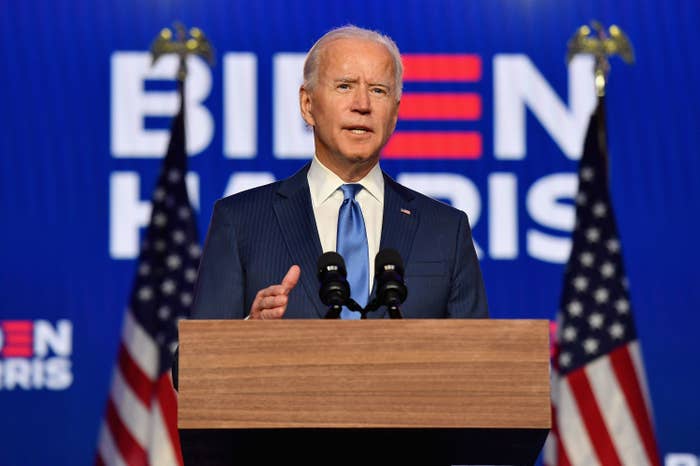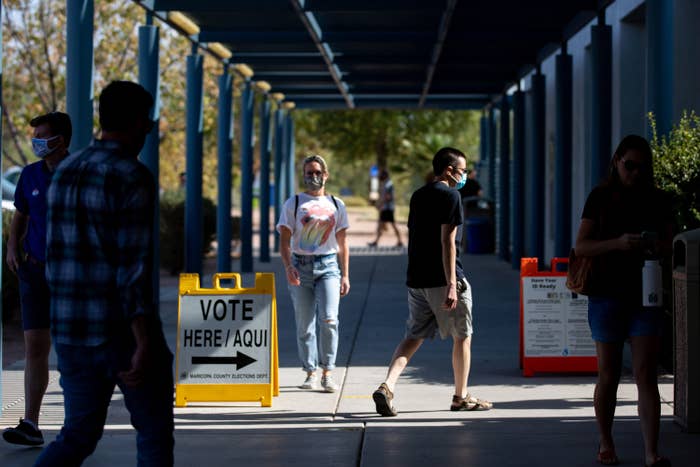
Joe Biden delivers remarks at the Chase Center in Wilmington, Delaware, on Nov. 6, 2020.
President-elect Joe Biden has officially won Arizona, delivering yet another victory for Democrats who have been trying to flip the Republican stronghold for decades.
Biden officially crossed the 270 count in the Electoral College on Saturday after Pennsylvania and Nevada were called for him and Kamala Harris, but the addition of Arizona’s 11 votes to his victory column is historic. The state last voted for a Democrat in 1996 when Ross Perot’s third party bid helped Bill Clinton defeat Republican Bob Dole. Before that, Arizona hadn’t voted for a Democrat since 1948.
The Arizona result was called by Decision Desk HQ at 8:29 p.m. local time with an estimated 24,738 ballots still left to be counted, according to the state's election tracker.
The announcement comes days after the Associated Press and Fox News that Biden won Arizona, outraging the Trump campaign at what was perceived as an early call. Candidates cannot request recounts in Arizona, and the margin to trigger an automatic recount is a razor-thin 0.1% discrepancy between candidates.

Voters enter Southeast Regional Library to cast their ballots on Nov. 3, 2020 in Gilbert, Arizona.
The vast majority of the votes in Arizona had been tallied by 3 a.m. Wednesday, but about 2.3 million voters in Arizona voted early and there were still around 250,000 mail-in ballots left to count. The ballots were largely from Maricopa County, which contains the mostly Democratic city of Phoenix and 60% of the state’s vote. This led many to believe that the remaining ballots would deliver a clear win for Biden, though Trump’s team insisted that he would be victorious.
In an article about its decision to call the state for Biden published Thursday, the AP explained that it believed there was no way for Trump to make up the remaining votes to be counted.
Other outlets, however, were not so sure. In most states in the country, mail-in ballots leaned heavily in Biden’s favor, as Trump had instructed his supporters not to trust the Postal Service and to vote in person instead. But Arizona has a strong vote-by-mail program that has been the primary method of vote-casting in the state for both parties for years. Of the remaining mail-in ballots to be counted, it was possible that a larger portion of them would be from Republicans than was the case in other states.
Despite the 2020 race being shockingly close in many states, Biden won more votes in previously solidly Republican states like Arizona and Georgia than any other Democratic candidate has in years.
For a long time, Arizona was nearly as conservative as any state could get. It’s the home state of Barry Goldwater, a five-term conservative senator who inspired a generation of small-government Republicans. John McCain, who was the Republican nominee against President Barack Obama in the 2008 election, represented Arizona in Congress from 1983 until his death from brain cancer in 2018. For years, both of Arizona’s Senate seats were consistently held by Republicans, and how the state would vote in presidential elections was not even a question. The state hasn’t voted for a Democratic presidential candidate since Bill Clinton in 1996.
Recently, however, the demographics of the state have changed dramatically. The state’s major cities have attracted people from nearby Democratic states with ballooning housing costs like California, and the state’s Latino population has grown to nearly a third of its residents. Since the last presidential election, many Latino Arizona residents came of age and cast their votes for the first time.
In 2018, Arizona voted Democratic Sen. Kyrsten Sinema into office, beating out Republican candidate Martha McSally. But when Arizona’s other Senate seat was vacated by McCain’s death, Arizona Gov. Doug Ducey appointed McSally to fill it.
On Thursday, McSally lost her Senate race again when she was defeated by Democratic challenger Mark Kelly, an astronaut and the husband of former Arizona representative Gabby Giffords, who was shot in the 2011 Tucson shooting that left six people dead.
Arizona’s previous senators, Jeff Flake and McCain, were two of the very few Republicans to continuously speak out against Trump. Though Flake often voted with the rest of his party, he was a vocal opponent of Trump’s and announced in 2017 that he would not seek reelection, citing his disgust with the president as the central reason for him stepping down from his seat.
McCain and Trump’s relationship was even more contentious. During Trump’s 2016 presidential campaign, McCain did not shy away from criticizing Trump’s behavior and policies, saying he disagreed with Trump’s comments about immigration and saying that his rhetoric “fired up the crazies.” In turn, Trump openly mocked McCain — who was captured and tortured while serving in the Vietnam War in the 1960s — saying at a public event in 2015 that McCain was not a war hero “because he was captured” and “I like people who weren’t captured.”
The feud continued throughout Trump’s presidency, and even after McCain’s death. In 2017, after he was diagnosed with brain cancer, McCain was the deciding vote in opposition of Trump’s attempt to repeal the Affordable Care Act, triggering critical tweets from the president. After he died in August 2018, Trump did not attend his funeral and continued to tweet disparaging statements about the late senator, including calling him the “last in his class” in college, and, bizarrely, saying at a 2019 rally that he held “the kind of funeral [McCain] wanted,” but that Trump “didn’t get a thank you.” Trump added that he “wasn’t a fan of John McCain.”
This year, Cindy McCain, the late senator’s spouse, publicly endorsed Biden for president, saying that Biden was the “one candidate in this race who stands up for our values as a nation.”




0 Comments